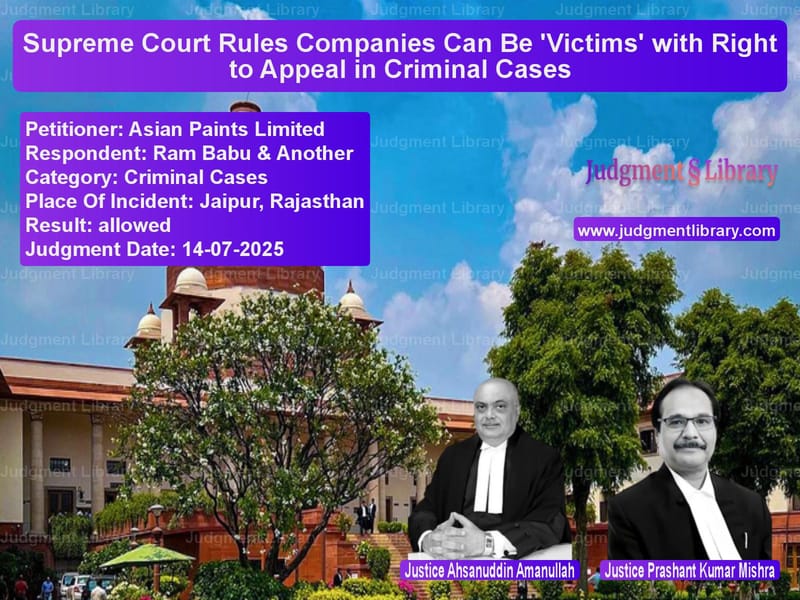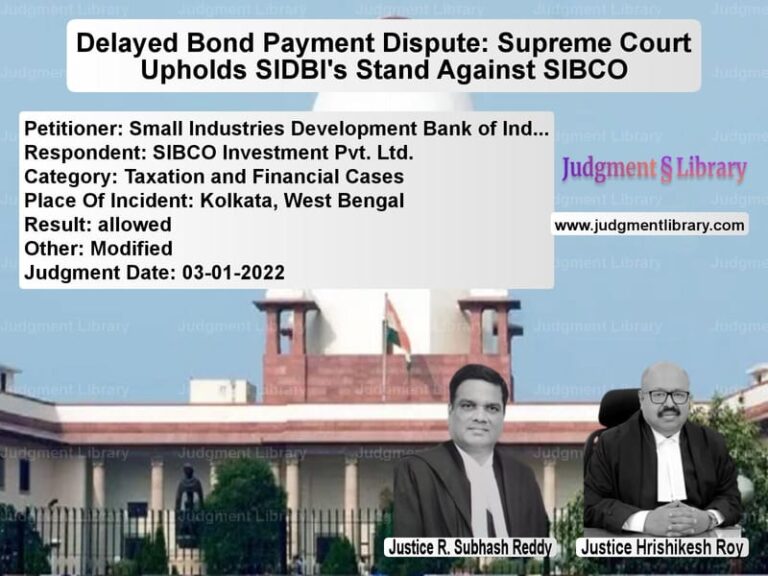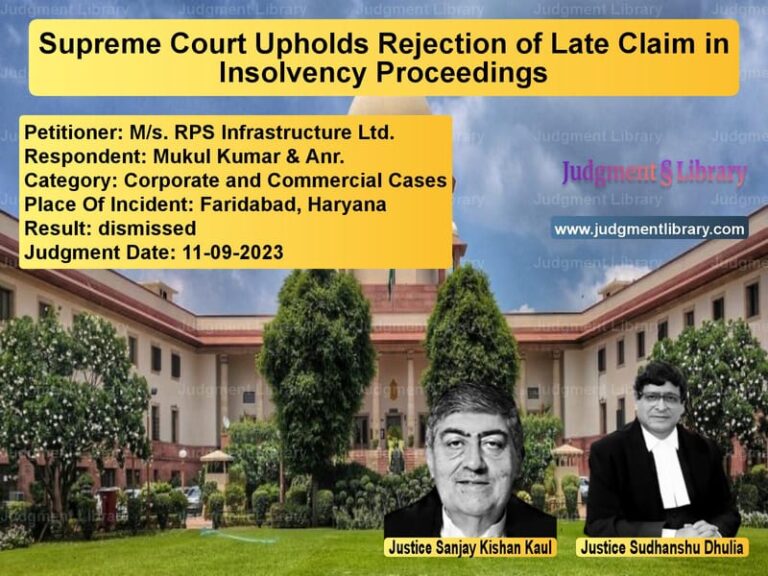Supreme Court Rules Companies Can Be ‘Victims’ with Right to Appeal in Criminal Cases
In a landmark judgment that significantly expands the rights of corporate entities in criminal proceedings, the Supreme Court of India has ruled that companies can be considered ‘victims’ under criminal law with the right to appeal against acquittals. The case involving Asian Paints Limited versus Ram Babu addresses a crucial legal question about whether corporate entities, when affected by crimes such as trademark infringement and counterfeiting, have the same rights as individual victims to challenge acquittals in criminal cases.
The dispute originated from an incident on February 6, 2016, when investigators working on behalf of Asian Paints discovered counterfeit paint products being sold at Ganpati Traders, a shop owned by Ram Babu in Tunga, Rajasthan. The investigation revealed that 12 buckets filled with paint bearing marks similar to Asian Paints’ trademarks were being sold as genuine products. The police seized the counterfeit products and arrested Ram Babu, leading to the registration of FIR No.30/2016 under Sections 420/120B of the Indian Penal Code and Sections 63/65 of the Copyright Act.
The Legal Journey
The case went through multiple judicial levels before reaching the Supreme Court. The Trial Court convicted Ram Babu on October 3, 2019, sentencing him to three years of simple imprisonment under Section 420 IPC, two years under Section 63 of the Copyright Act, and one year under Section 65 of the Copyright Act, along with substantial fines. However, the First Appellate Court set aside this conviction and acquitted Ram Babu on February 16, 2022.
Asian Paints, aggrieved by this acquittal, filed an appeal before the High Court of Rajasthan under the proviso to Section 372 of the Criminal Procedure Code (CrPC). The High Court dismissed the appeal as not maintainable, holding that Asian Paints could not be considered a ‘victim’ under Section 2(wa) of CrPC and that the appeal mechanism under Section 372 was not available to challenge an acquittal by the First Appellate Court.
Asian Paints’ Arguments
Asian Paints, through its counsel, made several compelling arguments before the Supreme Court. The company contended that “a literal interpretation is sufficient to establish that the Appellant squarely fell within the ambit of the said provision.” regarding the definition of ‘victim’ in Section 2(wa) of CrPC.
The company argued that “the term ‘person’ in Section 2(wa) of the CrPC also includes a ‘Company or Association or body of persons’ by virtue of Section 11 of the IPC. As such, the Appellant would fall within the contours of the term ‘victim’.” This interpretation would mean that corporate entities have the same legal standing as individual victims when they suffer harm from criminal activities.
Asian Paints emphasized that “the underlying FIR which was lodged, giving rise to the instant Appeal, was primarily registered under Sections 63/65 of the Copyright Act, on account of infringement of the Appellant’s copyright by the Respondent No.1. It was urged that this was sufficient to prove that it was the Appellant who suffered ‘loss or injury’ as mentioned in Section 2(wa) of the CrPC. The loss/injury was in the nature of reputational and financial losses on account of the commission of the afore-mentioned offence(s) by Respondent No.1.”
The company relied heavily on the Supreme Court’s earlier decision in Jagjeet Singh v Ashish Mishra, quoting: “23. A ‘victim’ within the meaning of CrPC cannot be asked to await the commencement of trial for asserting his/her right to participate in the proceedings. He/She has a legally vested right to he heard at every step post the occurrence of an offence. Such a ‘victim’ has unbridled participatory rights from the stage of investigation till the culmination of the proceedings in an appeal or revision. We may hasten to clarify that ‘victim’ and ‘complainant/informant’ are two distinct connotations in criminal jurisprudence. It is not always necessary that the complainant/informant is also a ‘victim’, for even a stranger to the act of crime can be an ‘informant’, and similarly, a ‘victim’ need not be the complainant or informant of a felony.”
Respondent’s Counter-Arguments
Ram Babu, through his counsel, argued against the maintainability of Asian Paints’ appeal. He contended that “an appeal under Section 372 of the CrPC is guided and controlled by Section 374 of the CrPC, which is evident from the words ‘such appeal shall lie to the Court to which an appeal ordinarily lies against the order of conviction of such Court’ used in the proviso to Section 372 of the CrPC. It was submitted that Section 374 of the CrPC does not provide for filing an appeal against an order passed in appeal by the First Appellate Court.”
He further argued that “the complaint dated 06.02.2016 was made by Mr. Pankaj Kumar Singh, an investigator employed by M/s Solution, who was neither an employee nor an authorised agent of the Appellant and therefore, he cannot be said to have acted as an agent of the Appellant apropos the Appellant being covered under Section 2(wa) of the CrPC. As such, the Appellant has/had no locus or authority to initiate any proceedings challenging the correctness of Judgment dated 16.02.2022 passed by the First Appellate Court.”
Supreme Court’s Analysis
The Supreme Court, in its detailed analysis, examined the definition of ‘victim’ under Section 2(wa) of CrPC, which states: “‘victim’ means a person who has suffered any loss or injury caused by reason of the act or omission for which the accused person has been charged and the expression ‘victim’ includes his or her guardian or legal heir.”
The Court observed that “Section 2(wa) of the CrPC defines ‘victim’ in plain and simple language as a ‘person who has suffered any loss or injury caused by reason of the act or omission for which the accused person has been charged…’. It is clear that Section 2(wa) of the CrPC has thoughtfully accorded an expansive understanding to the term ‘victim’ and not a narrow or restricted meaning.”
The Court emphasized that “In the present case, there cannot be any two opinions, that ultimately, it is the Appellant who has suffered due to the counterfeit/fake products being sold/attempted to be sold as having been manufactured by the Appellant. The Appellant would suffer financial loss and reputational injury if such products would be bought by the public under the mistaken belief that the same belonged to the Appellant’s brand.”
Key Legal Principles Established
The Supreme Court made several important legal determinations in its judgment. The Court held that “Section 372 of the CrPC is a self-contained and independent Section; in other words, it is a stand-alone Section. Section 372 of the CrPC is not regulated by other provisions of Chapter XXIX of the CrPC. The proviso to Section 372 of the CrPC operates independently of and shall not be read conjointly with any other provision in the CrPC, much less Section 378 of the CrPC.”
Regarding the right of appeal, the Court stated: “The language employed by the proviso to Section 372 of the CrPC is unambiguous to the effect that ‘the victim shall have a right to prefer an appeal against any order passed by the Court acquitting the accused or convicting for a lesser offence or imposing inadequate compensation, and such appeal shall lie to the Court to which an appeal ordinarily lies against the order of conviction of such Court.'”
The Court further clarified that “From the aforesaid elucidation, it is clear that the right to appeal accrues on the ‘victim’ from the instance of a Court acquitting the accused. The proviso to Section 372 of the CrPC is agnostic to the factum of such acquittal being by the Trial Court or the First Appellate Court.”
Broader Implications
This judgment has far-reaching implications for corporate entities and intellectual property rights protection in India. By recognizing companies as ‘victims’ in criminal proceedings, the Supreme Court has strengthened the legal framework for combating counterfeiting and trademark infringement.
The Court relied on the precedent set in Mallikarjun Kodagali v State of Karnataka, where it was observed: “73. In our opinion, the proviso to Section 372 CrPC must also be given a meaning that is realistic, liberal, progressive and beneficial to the victim of an offence.” This progressive interpretation aligns with international standards, particularly the United Nations Declaration of Basic Principles of Justice for Victims of Crime and Abuse of Power, often referred to as the Magna Carta of victims’ rights.
The Court also referenced Mahabir v State of Haryana, noting: “53. Therefore, by the aforesaid provision a right has been created in favour of the victim, which was not existing earlier in the Code, i.e., that a victim shall have a right to prefer an appeal against any order passed by the court acquitting the accused or convicting for a lesser offence or imposing inadequate compensation.”
Conclusion and Directions
The Supreme Court allowed Asian Paints’ appeal, setting aside the High Court’s judgment and restoring the company’s appeal for hearing on merits. The Court directed that “Since the incident in question is of the year 2016, the Registrar (Judicial), Jaipur Bench of the High Court is directed to place the matter before the learned Chief Justice, who in turn, is requested to allocate the same to a learned Single Bench to hear the matter on merits expeditiously.”
This landmark judgment represents a significant step forward in recognizing the rights of corporate entities as victims in criminal proceedings. It establishes that companies suffering from financial and reputational harm due to criminal activities have the same right to appeal against acquittals as individual victims. The decision strengthens the legal protection available to businesses against counterfeiting and intellectual property theft, while also affirming the progressive interpretation of victim rights in Indian jurisprudence.
The ruling ensures that the criminal justice system remains accessible to all victims, regardless of whether they are individuals or corporate entities, and reinforces the principle that justice should be equally available to all segments of society affected by criminal activities.
Petitioner Name: Asian Paints Limited.Respondent Name: Ram Babu & Another.Judgment By: Justice Ahsanuddin Amanullah, Justice Prashant Kumar Mishra.Place Of Incident: Jaipur, Rajasthan.Judgment Date: 14-07-2025.Result: allowed.
Don’t miss out on the full details! Download the complete judgment in PDF format below and gain valuable insights instantly!
Download Judgment: asian-paints-limited-vs-ram-babu-&-another-supreme-court-of-india-judgment-dated-14-07-2025.pdf
Directly Download Judgment: Directly download this Judgment
See all petitions in Fraud and Forgery
See all petitions in Corporate Compliance
See all petitions in unfair trade practices
See all petitions in Company Law
See all petitions in Judgment by Ahsanuddin Amanullah
See all petitions in Judgment by Prashant Kumar Mishra
See all petitions in allowed
See all petitions in supreme court of India judgments July 2025
See all petitions in 2025 judgments
See all posts in Criminal Cases Category
See all allowed petitions in Criminal Cases Category
See all Dismissed petitions in Criminal Cases Category
See all partially allowed petitions in Criminal Cases Category







